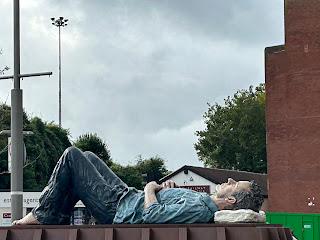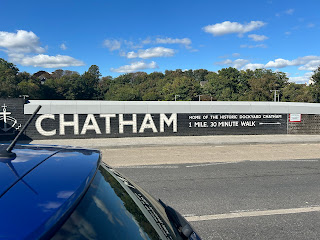FROM ROYALTY TO RUBBISH
Printed in the National League South game v St.Albans City Tuesday 22nd October 2024 We drew 2-2 in front of 730
So what have we learnt from this years FA Cup adventure? Chichester is a Diocese, Chathams a friendly town where everyone sounds like they’re from Slough and Woking? Well it has random statutes in the High Street and you are allowed to elbow people in the head before you score a goal.
It also came to pass that replays are for only for lower pond weed football clubs. This is because there are too many games for league teams and it’s given them a migraine. Which is why they have introduced the National League competition, the Champions League Matrix and the Vic Nasal Spray Cup to ease congestion.
Once again we were treated to some good old National League hospitality. If you want to stand at Woking there’s no cover, no bar, hot food that’s cold, squeezy cheese from a bottle and even worse toilets that look like said squeezy cheese has been sprayed over them. All yours for £18. Infact there’s a proscribed list for away fans that dictatorships would be proud of. As for the disabled toilet this was through a dilapidated gate, over some gravel and oh, mind the hosepipe. The very essence of accessibility.
Nick the Trumpet was escorted by Chief Steward 007 back to his car to put his illegal weapon away. Clubshop Sue wasn’t allowed her umbrella despite the rain threatening to mess up her hair. 'It's against the rules'. But how about dirty toilets and uncooked food being against the rules?
In contrast Chatham gave us a great away day
and welcomed the Rebel Rabble with open arms. It felt like a club on
the up. Infact the only hostility we got was a Percy pig sweet thrown
at us. Even then, at the end of the game a sorry looking lad
apologised for that. The first pub we went in and the landlord said his
mum and dad used to run the Merrymakers in Langley! One bloke said
he went to one game in the not so distant past where there were 24
people, now crowds averaged nearly a thousand last season. They have
a decent clubhouse both sides of the ground, youngsters in club
colours, TV’s everywhere and a stand that we would like to steal
one dark night when no one was looking. You could see the game, the
acoustics were spot on and as for the sounds from the sticks. It felt
like being in our old oil drum bashing band Oi, Leave It Out. Like
playing in the Albert Hall. Not that we ever played at the Albert
Hall more like the old Prince of Wales (now a McDonalds) and manky
squats in London (now probably renovated and worth millions). Maybe
we will get a blue plaque?
What also became apparent was that the Slough youngsters are taking over with the songs, noise and atmosphere. If the crowd was good at Chatham, it was off the scale at Woking where we had our biggest away following since that famous win at Kings Lynn with at least 400 + Rebels making the trip.
After our Aveley pitstop in Rainham, Spreadsheet Stu has now got a taste for workingmens clubs, the trick is getting in. Thanks to a friendly phone call the night before they let me into the Woking Railway Athletic Club after the manager looked me up and down and said I didn’t look like trouble – apart from those piercings! It was bustling at 11.30 and had everything you would expect including home made rolls, pints for £3.25 and a meat raffle.
Next stop was the Sovereign where half the away coach and more Rebels had descended. The pub was where Woking Football Club held its first meeting in 1887 to announce that the the town now had a football club. It was then called the Railway Hotel. They also used to be nicknamed the Cremators which sounds like a ska band featuring a trumpet which was no doubt confiscated.
Matchdays are now a catwalk when you’re with Alan Brown with his flamboyant bespoke shirts. He even had women chasing him up Woking High Street asking about his top like some Benny Hill sketch. As we left the Sovereign and made our way through gardens and Westfield Football Club, woman swooned, the rain stopped and the sun came out.
And so our FA Cup adventure ended with a fuming Scott Davies and even their stewards asking how we didn’t win the game. I wish Woking – and Bromley – nothing but relegation and sorrow. And getting 007 to crawl on his hands and knees and scrub those toilets as part of his hospitality challenged punishment. Sorry, but thems the rules mate.






